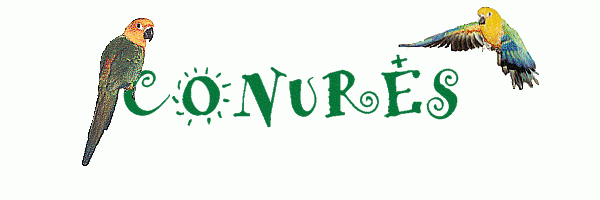

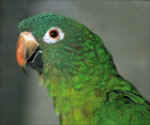
Blue Crown Conure |
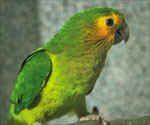
Brown Throat Conure |
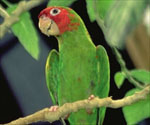
Cherryhead Conure |
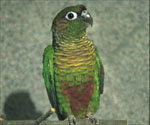
Dusky Conure |
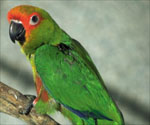
Gold Cap Conure |
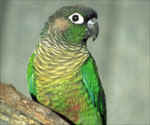
Green Cheek Conure |
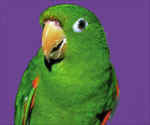
Green Conure |
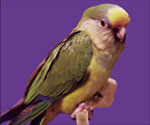
Halfmoon Conure |
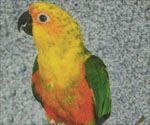
Jenday Conure |
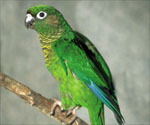 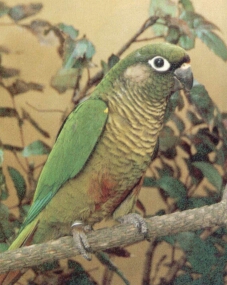
Maroon-Bellied Conure |
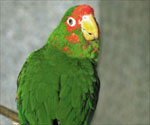
Mitread Conure |
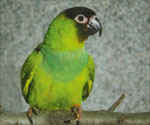
Nanday Conure |
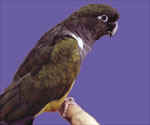
Patagonian Conure |
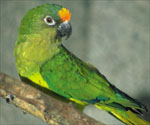
Peach Front Conure |
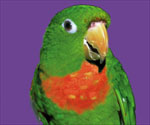
Red Throat Conure |
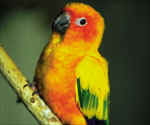
Sun Conure |
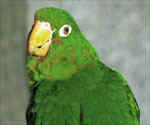
White Eye Conure |
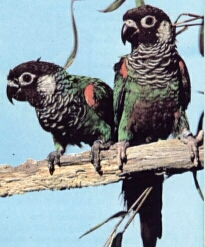
White-eared Conure |
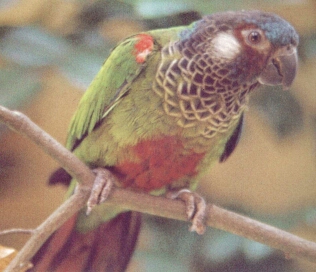
Painted Conure |
Traits:
Conures are mid-sized, intelligent and affectionate members of the parrot family. They are related to macaws but have a small body size. Conures are distinctive looking with large heads and beaks and thin bodies. They have a reputation for being noisy and destructive. However, this does not apply to all conures. Both sexes are known to talk, perform tricks and are loving companions if acquired at a young age. Conures tend to bond with one person or territory and need to have a great deal of socialization and stimulation to stay a happy, healthy member of your family. Conures should eat a staple diet of fresh pellet formula or a fortified parrot seed diet. Pelleted diets are recommended because each pellet contains balanced nutrition. Besides a variety of pellet or a seed mix diet, offer chopped dark green and yellow vegetables, and a variety of fresh fruits in addition to a protein source like mature legumes, hard cooked chopped egg, and grated cheese. Avoid the following foods: Iceberg lettuce, and cabbage, (these can cause severe diarrhea); caffeine (contained in chocolate and soda); avocado and parsley, (these can be poisonous). Raisins and bananas should be given in moderation (these can cause constipation). Remove fresh fruits and vegetables within 2 hours of offering to prevent spoilage. If the bird gets too much liquid from the fresh fruits and vegetables, the droppings could become runny and discolored. Stop the fresh fruits and vegetables for a day to see if this is the reason. Birds require fresh water each day. Wash and rinse their water cup out thoroughly prior to adding fresh water to reduce bacteria growth. Powdered vitamins (only necessary if on a seed diet) can be lightly sprinkled on the fresh food, but putting it in the water can encourage bacterial growth. When choosing a cage for your bird, remember width is more beneficial to the bird than height. Birds must be able to stretch their wings and still have room for a variety of toys without hitting them, therefore, the larger the cage the better. Ideally the cage for a conure should measure a minimum of 18 " length by 18" high and 22" wide. Perches are an essential part of the cages and should be chosen to suit the feet of the bird. A variety of perch sizes, shapes, and diameters will help exercise the bird's feet and toes. Place perches strategically to prevent droppings from contaminating water and food dishes and to prevent the tail from hanging in dishes or on the floor. A variety of toys suitable for cockatiel and conure sized birds should be used, such as bells and wooden blocks in the bird's cage, these will assist you in entertaining your bird. Always have a cuttlebone or mineral block available to supply calcium and prevent beak overgrowth. To aid the bird in keeping itself clean, we recommend placing a suitable size birdbath in the cage or lightly misted with tepid water on a weekly basis. Place your conure's cage below eye-level in a bright area free from drafts and direct sunlight.
|
The Conure Ring Home Page http://www.geocities.com/RainForest/Vines/4545/conures.html
Welcome to Conure World!!! http://home.talkcity.com/GrouchoGulch/birdyboy/Birdy.html
Links to Other Conure Pages http://www.concentric.net/~conure/conlink.shtml
Welcome to the International Conure Association http://www3.upatsix.com/ica/
Welcome to Conure List Home Page http://www.ddc.com/petplace/conurelist/
Conures - ONElist http://www.onelist.com/subscribe.cgi/conures
Parrot Society of Australia http://www.parrotsociety.org.au/articles/art_026.htm
Hotspot for Birds http://www.multiscope.com/hotspot/